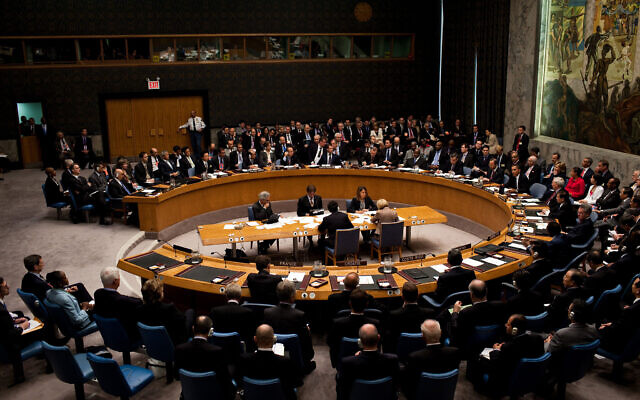Cameron says watered-down UN vote on Gaza signals ‘greater unity’ over response
The UK Foreign Secretary repeated calls for steps towards a “sustainable ceasefire” following the approval of the vote by 13-0, with the United States and Russia abstaining.

Lord David Cameron has said there is “greater unity” over the response to the crisis in Gaza after the UN Security Council adopted a watered-down resolution calling for the immediate acceleration of aid deliveries to civilians.
The UK Foreign Secretary repeated calls for steps towards a “sustainable ceasefire” following the approval of the vote by 13-0, with the United States and Russia abstaining.
But charities and aid organisations said the resolution does not go far enough and urged the UK to call for a permanent and immediate cessation of violence.
It came after a US veto of a Russian amendment that would have restored the call for a suspension of hostilities, which is absent from the revised text.
That vote was 10 members in favour, the US against and four abstentions.
The new resolution was negotiated during a week-and-a-half of high-level diplomacy by the United States, the United Arab Emirates on behalf of Arab nations and others.
Lord Cameron welcomed the vote as “good news” in a statement, saying: “Crucially, the resolution also calls for steps towards a sustainable ceasefire. This is an outcome that I advocated for last week along with the German foreign minister and strongly think is the right approach.
“A sustainable ceasefire must mean that Hamas is no longer there, able to threaten Israel with rocket attacks and other forms of terrorism.”
He added: “It has been a difficult process to reach agreement within the UN but there is now greater unity and purpose about what needs to happen to relieve the humanitarian crisis, and to start working towards the sustainable ceasefire that the British Government has argued for.”
Labour leader Sir Keir Starmer also welcomed the vote, saying: “The next humanitarian truce is urgent, and in the space it brings, intense diplomacy should begin to set new terms under which fighting does not restart and the risk of escalation is reduced.
“Hamas must release all the remaining hostages, end all attacks on Israel and have no role in the future governance of Gaza. Israel must agree to end its bombing campaign, allow a humanitarian surge into Gaza, and end settler violence and displacement in the West Bank.”
He said a sustained ceasefire was “necessary, but not sufficient” to ensuring long-term peace in the region, insisting there must be “a new political process that has the capacity, conviction and commitment to turn a rhetoric around two states living side by side in peace into reality”.
Charities and human rights organisations said that the resolution does not go far enough.
Amnesty urged the UK Government to “make the case for an urgently needed, immediate and enduring ceasefire” while ActionAid warned that without a ceasefire, aid cannot be delivered “safely and at scale”.
William Bell, head of Middle East policy at Christian Aid, said the vote had “fallen short” of backing a ceasefire, adding: “Only a permanent ceasefire can safely deliver the scale of humanitarian aid required. Pressure must also be kept up until the unconditional release of all hostages is agreed.”
Oxfam GB’s interim chief executive Aleema Shivji said the failure to call for a ceasefire amounted to a “profound dereliction of duty from an organisation established to uphold the UN Charter” and urged the UK Government to use its influence to push for stronger action.
Israel’s war to destroy Hamas has killed more than 20,000 people, health officials in Gaza have said. It follows Hamas’s October 7 attacks, in which some 1,200 people were killed and 240 were taken hostage.
Israel’s expanding aerial and ground offensive has been one of the most devastating military campaigns in modern history, displacing nearly 85% of a population of 2.3 million and levelling wide swathes of the tiny coastal enclave.
On Friday, the US won the removal of a tougher call in the UN Security Council resolution for an “urgent suspension of hostilities” between Israel and Hamas.
The vote was the first on the war to make it through the council after the US vetoed two earlier ones calling for humanitarian pauses and a full ceasefire.
Martin Griffiths, the UN humanitarian affairs chief, lamented inaction over the conflict.
In a post on X, formerly Twitter, he said: “That such a brutal conflict has been allowed to continue and for this long – despite the widespread condemnation, the physical and mental toll and the massive destruction – is an indelible stain on our collective conscience.”
Latest
17:4722 Dec 2023218 words
“The UK is doing everything it can to get more aid in, as I saw when I visited Al Arish in Egypt, near the border with Gaza, this week. People across Gaza urgently need food, medicine and shelter. We have consistently argued for more aid and called on Israel to open more border crossings.

Thank you for helping to make Jewish News the leading source of news and opinion for the UK Jewish community. Today we're asking for your invaluable help to continue putting our community first in everything we do.
For as little as £5 a month you can help sustain the vital work we do in celebrating and standing up for Jewish life in Britain.
Jewish News holds our community together and keeps us connected. Like a synagogue, it’s where people turn to feel part of something bigger. It also proudly shows the rest of Britain the vibrancy and rich culture of modern Jewish life.
You can make a quick and easy one-off or monthly contribution of £5, £10, £20 or any other sum you’re comfortable with.
100% of your donation will help us continue celebrating our community, in all its dynamic diversity...
Engaging
Being a community platform means so much more than producing a newspaper and website. One of our proudest roles is media partnering with our invaluable charities to amplify the outstanding work they do to help us all.
Celebrating
There’s no shortage of oys in the world but Jewish News takes every opportunity to celebrate the joys too, through projects like Night of Heroes, 40 Under 40 and other compelling countdowns that make the community kvell with pride.
Pioneering
In the first collaboration between media outlets from different faiths, Jewish News worked with British Muslim TV and Church Times to produce a list of young activists leading the way on interfaith understanding.
Campaigning
Royal Mail issued a stamp honouring Holocaust hero Sir Nicholas Winton after a Jewish News campaign attracted more than 100,000 backers. Jewish Newsalso produces special editions of the paper highlighting pressing issues including mental health and Holocaust remembrance.
Easy access
In an age when news is readily accessible, Jewish News provides high-quality content free online and offline, removing any financial barriers to connecting people.
Voice of our community to wider society
The Jewish News team regularly appears on TV, radio and on the pages of the national press to comment on stories about the Jewish community. Easy access to the paper on the streets of London also means Jewish News provides an invaluable window into the community for the country at large.
We hope you agree all this is worth preserving.





















